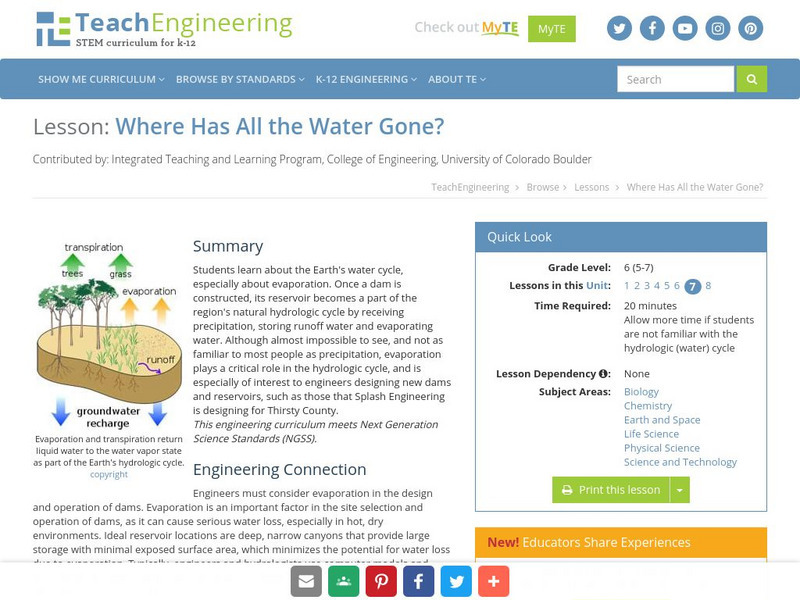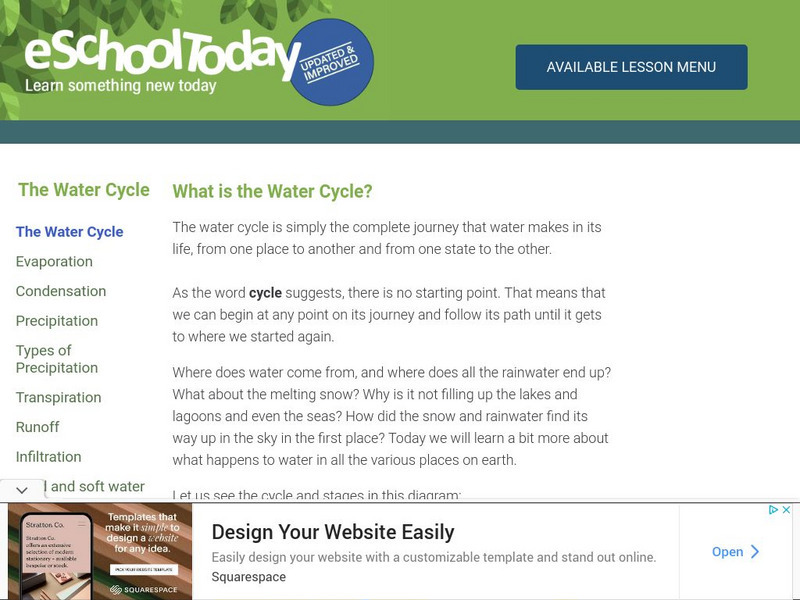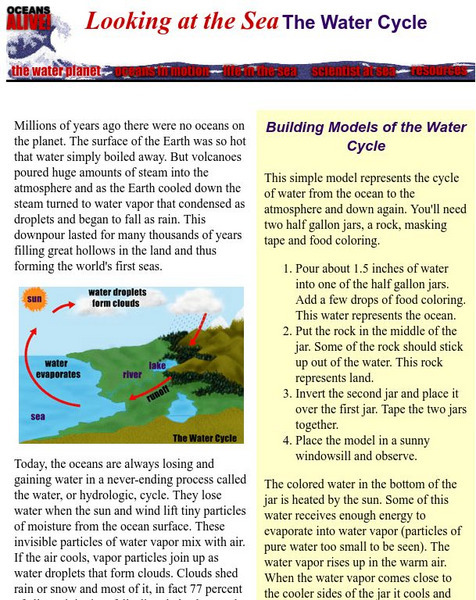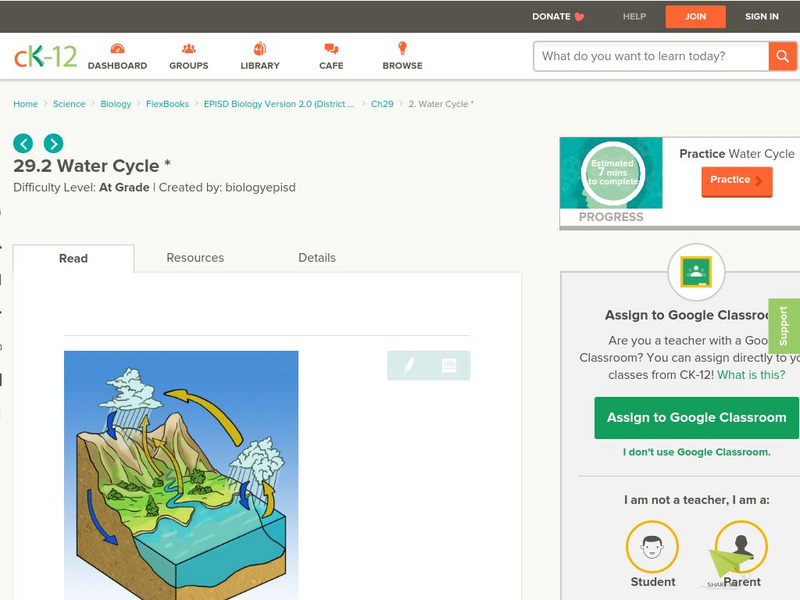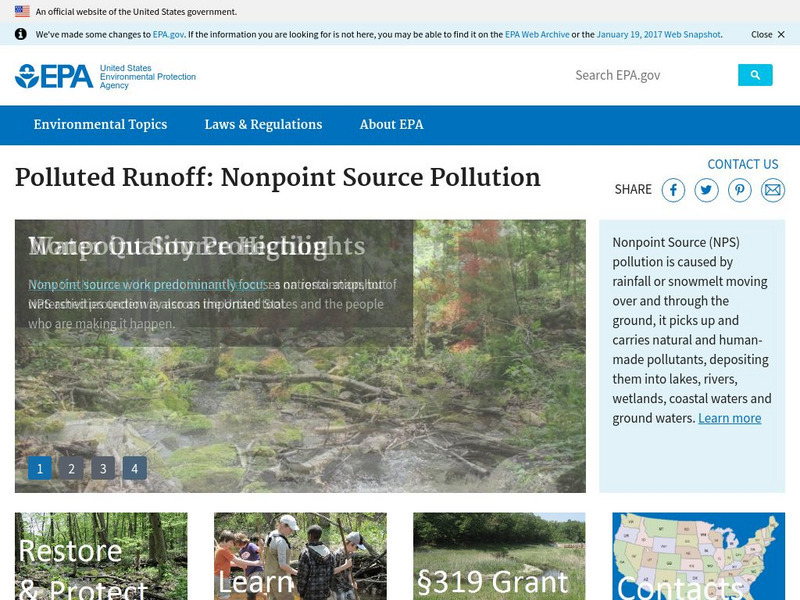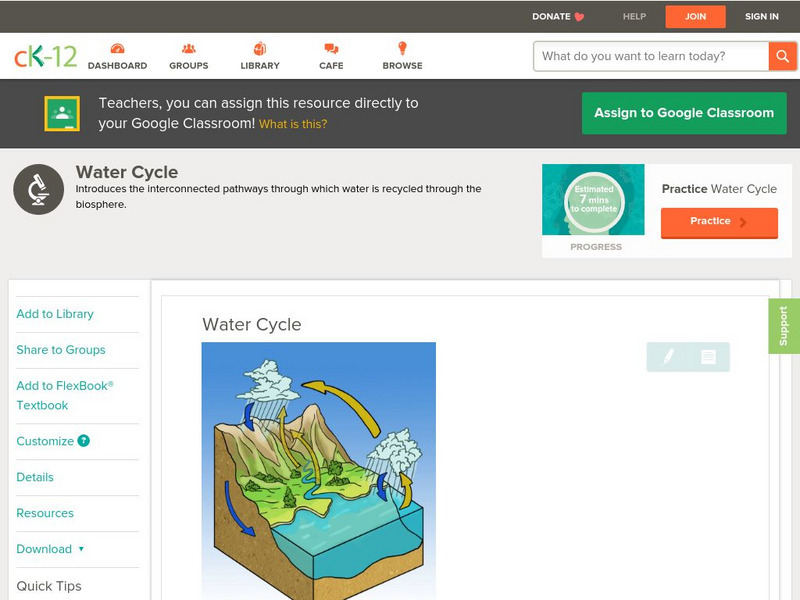TeachEngineering
Teach Engineering: Natural and Urban "Stormwater" Water Cycle Models
Students apply their understanding of the natural water cycle and the urban stormwater water cycle, as well as the processes involved in both cycles to hypothesize how the flow of water is affected by altering precipitation.
TeachEngineering
Teach Engineering: Where Has All the Water Gone?
Students learn about the Earth's water cycle, especially about evaporation. Once a dam is constructed, its reservoir becomes a part of the region's natural hydrologic cycle by receiving precipitation, storing runoff water and evaporating...
Other
Virtual Field Trip: Water/aquifers
This virtual field trip for middle school students looks at aquifers and their place in the hydrologic cycle. Students learn why and how it is important to protect the source of your drinking water and some unique details about the...
TeachEngineering
Teach Engineering: Natural and Urban Stormwater Water Cycles
Through an overview of the components of the hydrologic cycle and the important roles they play in the design of engineered systems, students' awareness of the world's limited fresh water resources is heightened. The instructional...
eSchool Today
E School Today: Your Revision Notes on the Water Cycle
Learn about the different stages of the Earth's water cycle, and about processes involving water, including runoff, infiltration, and the differences between hard and soft water.
Science Buddies
Science Buddies: Make a Miniature Water Cycle Model
In this activity, you will investigate some of the processes that make water move in and out of the atmosphere by making a miniature water cycle model inside a plastic bag.
CK-12 Foundation
Ck 12: Earth Science: Water Pollution
[Free Registration/Login may be required to access all resource tools.] Describes the sources of water pollution, such as municipal, industrial, and agricultural.
Center for Educational Technologies
Earth Science Explorer: The Water Cycle
This is a very brief overview of the water cycle, but it does have a nice graphical representation.
CK-12 Foundation
Ck 12: Biology: Soil and Water Resources
[Free Registration/Login may be required to access all resource tools.] Covers soil and water resources and the threats to these resources.
US Geological Survey
Earth's Water: Rivers and Streams
The USGS explains the definition of a river and how a river is supplied with water. Included is a cross section of a river. Click Home to access the site in Spanish.
Missouri Botanical Garden
Missouri Botanical Garden: Water Pollution
Water pollution occurs when a body of water is adversely affected due to the addition of large amounts of materials to the water. The sources of water pollution are categorized as being a point source or a non-source point of pollution....
Museum of Science
Oceans Alive: The Water Planet
Check out this simple overview of the water cycle and learn how to build a model of the water cycle.
CK-12 Foundation
Ck 12: Fifth Grade Science: Earth Science: Water on Earth
[Free Registration/Login may be required to access all resource tools.] Discusses water and where it occurs on Earth, gives an overview of the water cycle, and explains how the ocean is an integral part of the water cycle and is...
University Corporation for Atmospheric Research
Ucar: The Water Cycle
This site provides a comprehensive introduction to the water cycle. Students construct a model to simulate parts of the water cycle. Includes background information, links to standards, lesson plans, and assessment ideas.
US Geological Survey
USGS: Urbanization and Water Quality
This website focuses on water quality issues in relation to urbanization. There are helpful links to brief articles on topics like storm runoff, wastewater, and the underground water table. Click "Water Science School HOME" to access the...
Georgia Department of Education
Ga Virtual Learning: Water and Wind
This interactive tutorial discusses the flow of water on the surface and below the surface. You will learn about the causes and actions of wind, and how water and wind move sediment.
CK-12 Foundation
Ck 12: Episd: Water Cycle
[Free Registration/Login may be required to access all resource tools.] An introduction to the biogeochemical cycle, the water cycle. Recognize evaporation, sublimation, and condensation. Identify groundwater and runoff water supplies.
Other
South Carolina Forestry Commission: Best Management Practices: Clean Water Act
Information about the first federal legislation to address pollution caused by stormwater runoff from the landscape.
Curated OER
Math/science Nucleus: Water Cycle Animation
This animation, in a storybook format, discusses water and the water cycle.
US Environmental Protection Agency
Epa: Polluted Runoff: Nonpoint Source (Nps) Pollution
EPA site offers answers to what nonpoint source pollution is as well as provides links and information as to what concerned citizens can do about it.
Other
Catawba Riverkeeper: Threats to Our Lake and Water
The most common problem on the Catawba River and its lakes is sedimentation. Sediment carried by stormwater runoff from construction sites in North Carolina has been documented as the leading source of non-point source pollution to...
American Geosciences Institute
American Geosciences Institute: Earth Science Week: Water: A Never Ending Story
Students carry out a number of activities that demonstrate the concepts of evaporation, condensation, precipitation, and soil moisture and runoff. Then students construct a terrarium as a way to observe the water cycle. Immediately...
CK-12 Foundation
Ck 12: Biology: Water Cycle
[Free Registration/Login may be required to access all resource tools.] Covers the water cycle.
CK-12 Foundation
Ck 12: Earth Science: Water Pollution
[Free Registration/Login may be required to access all resource tools.] Describes the sources of water pollution.
Other popular searches
- Storm Water Runoff
- The Water Cycle Runoff
- Storm Water Runoff Cities
- Water Runoff Collection
- Water Runoff Cities



